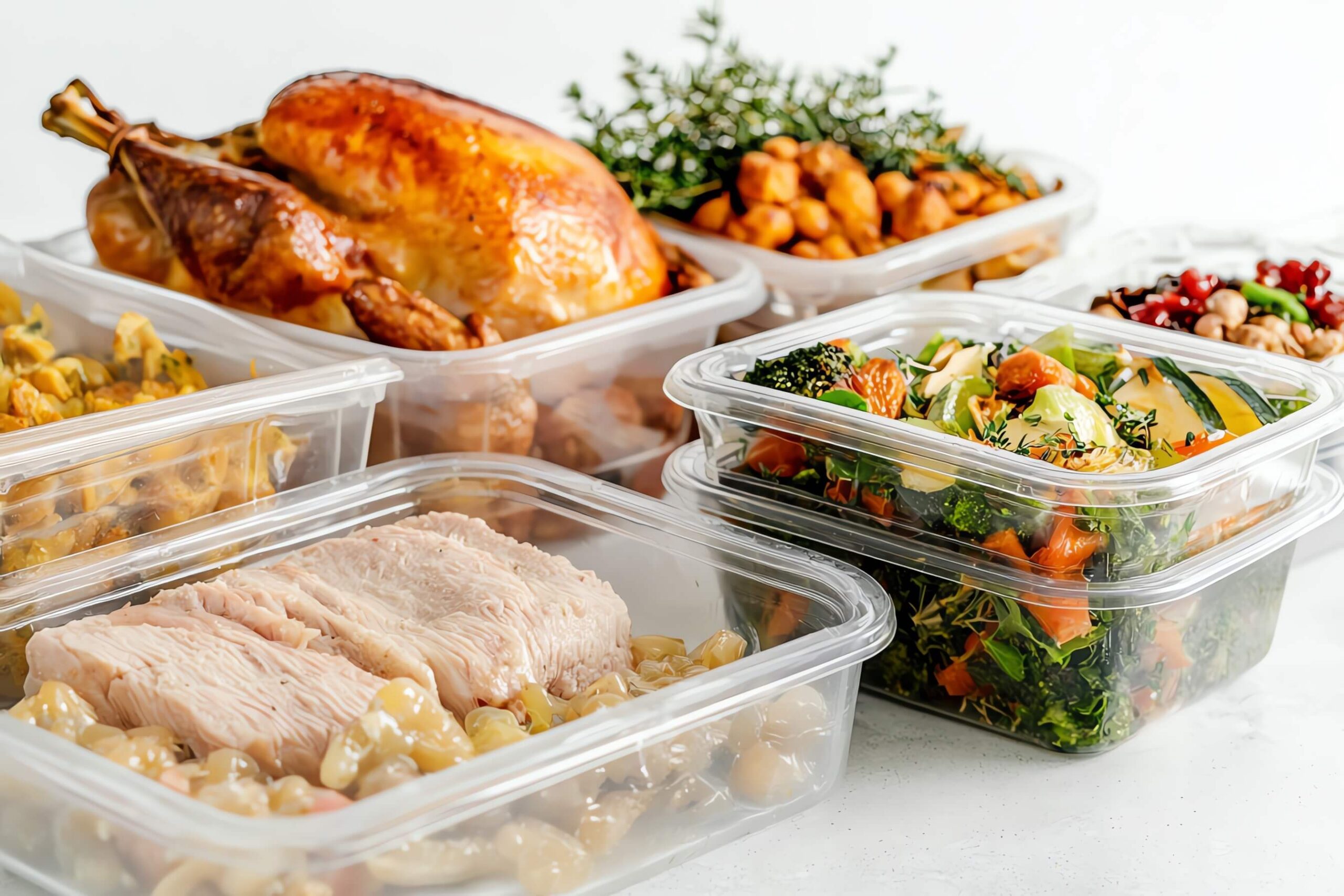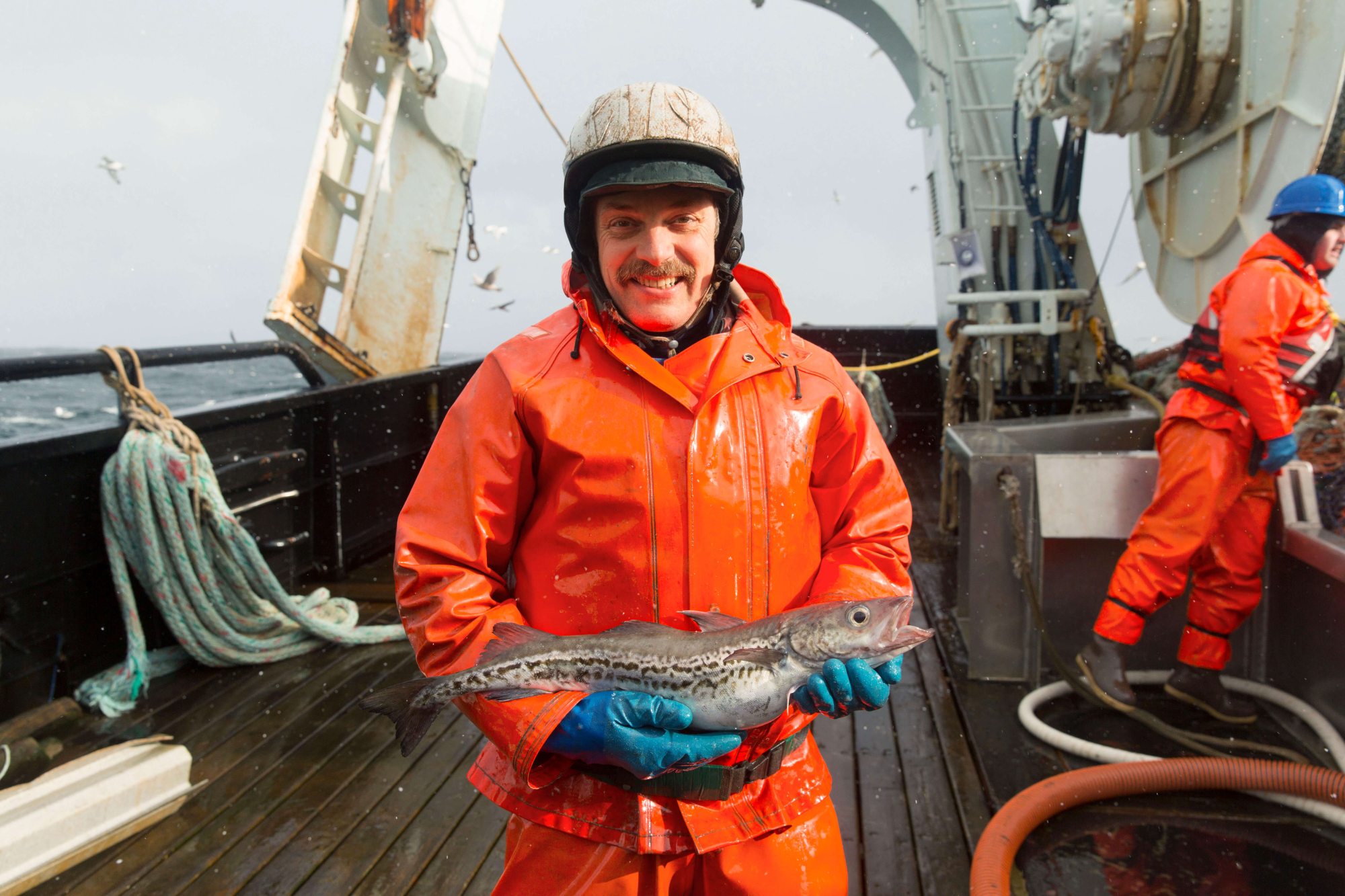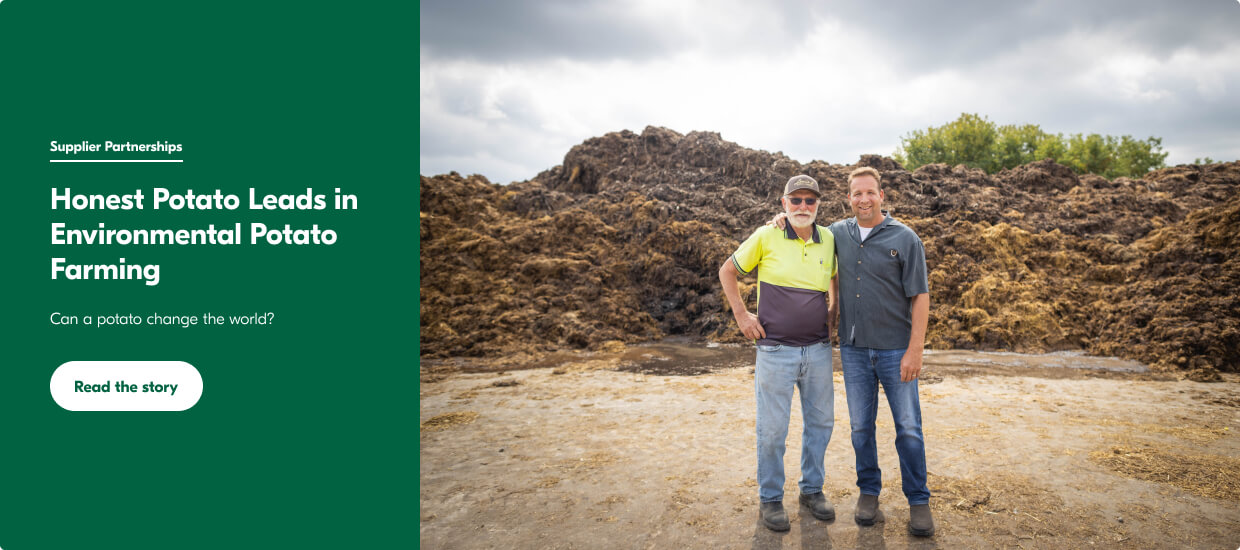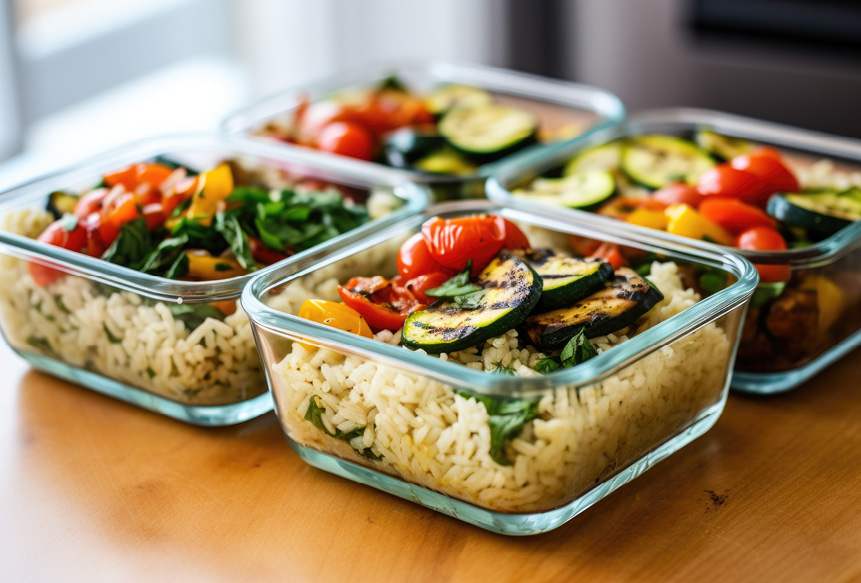What makes an honest potato? One that comes from a closed-circle, regenerative farming community.
“We have been supplying potatoes to Sobeys for 20 years now,” says Trevor Downey of fourth-generation family farm Downey Farms, near Shelburne, Ontario. “And recently, we introduced the Honest Potato, created as its own brand.”
The mission? To produce the best potatoes possible by employing sensible potato farming methods, to do everything possible to preserve the environment for future generations, and to inspire others to do the same.
We really want to tell the story about our closed loop and about being vertically integrated – from seed breeding, seed growing, potato growing, and packaging.
By forging partnerships with farmers and businesses in the area who share the same vision for the future, Downey hopes to move this vision forward. Everyone is working together towards common goals: to embrace regenerative agriculture and reduce food waste. The various partners involved include other potato growers, seed producers, potato processors, waste management companies, and other businesses that provide support.
Sobeys is happy to cheerlead, supporting the product, encouraging the problem-solving of environmental challenges, and offering russet and yellow Honest Potatoes in 10-pound recyclable bags, available in Sobeys stores across Ontario.
8 pillars of the Honest Potato’s regenerative agricultural
- Promote biodiversity – by incorporating a healthy mix of microorganisms, insects, birds, and other farm animals – resilient, natural systems – for a healthier ecosystem.
- Keep the land fertile and healthy – by protecting the soil with green ground cover.
- Minimize soil “disruption” – by cutting back on tilling. “We have good, heavy loam soil, a natural soil that has great drainage,” Downey says. “It’s very fertile, classified as an A soil type – that’s a high soil-type reading.
- Integrate livestock – by combining animals and plants in circular ecosystem with the spreading of manure. “Livestock allows us to have more natural fertilizer to apply to the ground.
- Rotate crops – by planting a different crop every year in the soil – in Downey’s case, over four years. Crop rotation helps with a variety of things, including reducing soil depletion and erosion, enhancing biodiversity, improving soil fertility, and controlling disease, pests, and weeds.
- Use less chemicals – “Another factor is where the potato farms are located,” Downey explains. “The farther away you are from other potato crops, the more of a controlled environment you have, where there’s going to be less disease pressure – no pests are coming in from a neighbouring crop. Less disease and healthy soils mean less reliance on chemicals.
- Decrease water usage – by managing it better. More organic matter in the soil helps it retain water better. “We build up a very good organic matter,” Downey says. “And when we do that, it holds moisture in the ground, so we’re less dependent on water. After a four-year crop rotation, when you grow that crop of potatoes, the soil is like a sponge.”
- Cultivate hay – to help remove carbon from the air, the tall grass acting like a filter, like all green plants and trees.
New ways of dealing with food waste
What about potatoes that aren’t quite pretty enough to go into a bag of Honest Potatoes? Due to bruising or decay or “greening” or pests? They go to a processing plant where they are turned into French fries, or they return to the farm for livestock feed. If they’re really damaged, they go to a biodigester, yet another Ontario business that helps through the process.
“The food waste is put through the biodigester, which produces hydroelectricity and fertilizer,” Downey says. “It also caps the methane gas.”
The biodigester uses natural anaerobic (oxygen-free) digestion, acting sort of like a giant mechanical stomach, where organic matter is broken down by microorganisms in an oxygen-free environment. This turns the waste that would otherwise be destined for landfill – excess produce, damaged fruit and vegetables, crop waste, scraps – into biogas that heats and cools farms, adding renewable bioenergy to the grid. The biodigester also produces nutrient-rich liquid fertilizer that is returned to the field and dry by-product that’s used for animal bedding.
The food waste is put through the biodigester, which produces hydroelectricity and fertilizer. It also caps the methane gas.
Canada’s yearly food waste is equivalent to 9.8 million tonnes of CO2. Fruits and vegetables account for 45% of food waste. Redirecting or rescuing surplus edible food could save 3.82 tonnes of greenhouse gas emissions per tonne of food. As more than 20% of food waste in Canada comes from farms, diverting as much as possible at the source is better for the environment.
“Probably about 10% of the potatoes we produce are picked out,” Downey says.
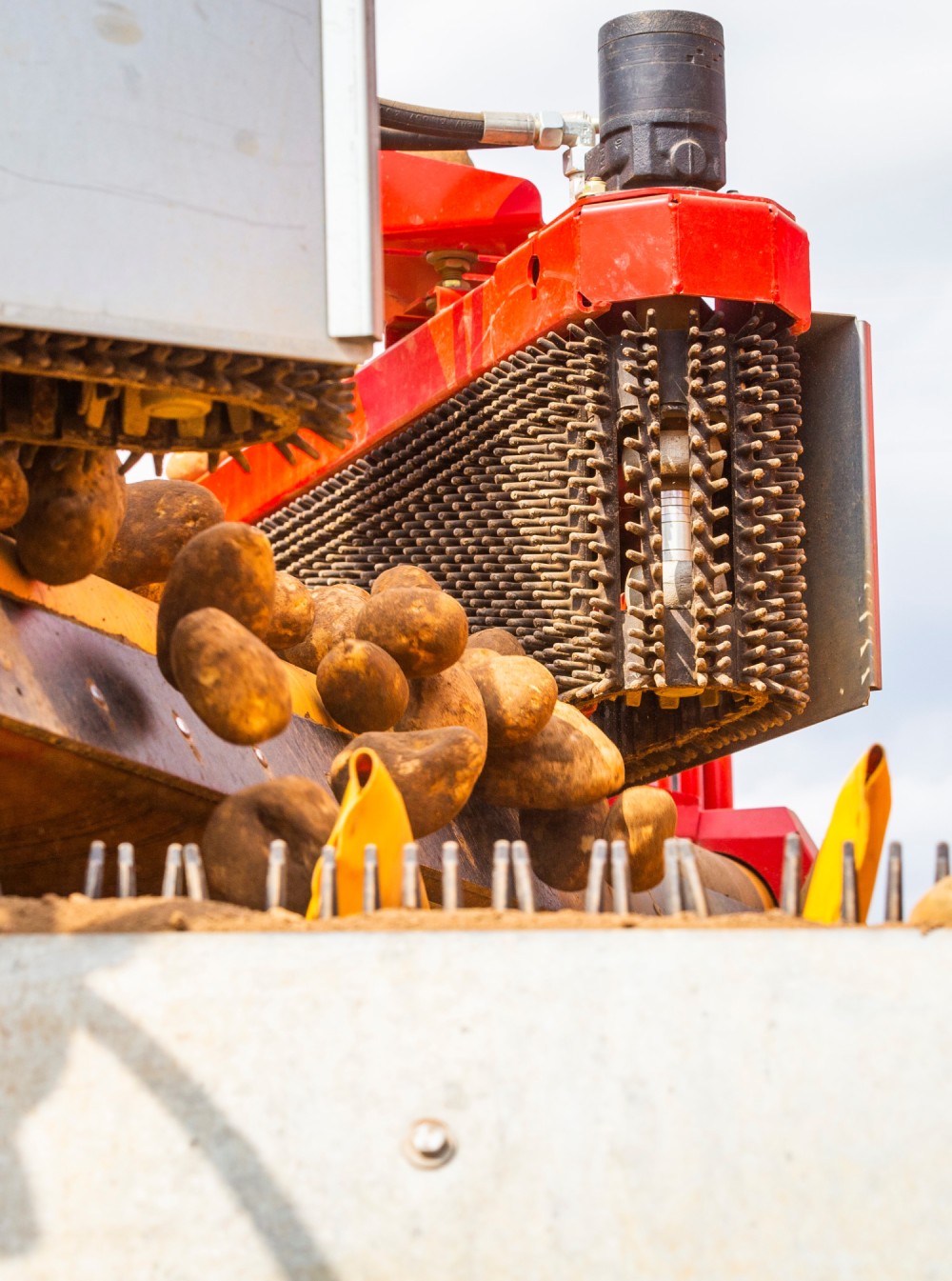
The honest facts
Honest Potatoes are grown in Ontario, in the Saugeen Valley, Bruce Country, Grey Country and Dufferin County.
Yellow potato
- Qualities: Flat and oval
- Uses: Mashing, roasting, soups, chowders, au gratin
- Maturation: 80 to 95 days
Russet potato
- Qualities: Large and long, with a thick skin
- Uses: Baking, fries, mashed, potato chips
- Maturation: 95 to 100 days
Cutting back the carbon footprint
The Honest Potato Company also has its own seed production now, a facility in Quebec. They wanted to create their own type of potato varieties and feed their own farm.
“We really want to tell the story about our closed loop,” Downey says, “and about being vertically integrated – from seed breeding, seed growing, potato growing, and packaging. And being close to the market – our potatoes are stored within 35 kilometres of where they’re grown. We are trying to share this with the consumer, so they can say, ‘I like buying these potatoes because they’ve cut back on everything.’”
Even the potato bag, which uses 15% less paper than traditional bags, goes right in the blue bin when it’s empty.
From all angles, having good farming sensibility is based on good land stewardship and is proving to make good business sense at the same time. With the Honest Potato championing biodiversity in an unending cycle, the land can stay happy and healthy, producing high-quality potatoes for generations to come.
